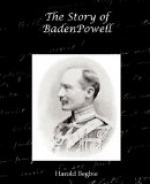Baden-Powell has all the qualifications that go to make a good scout. His eye is as keen as the hawk’s, and many a time “by keeping his eyes skinned” he has done useful, if unobtrusive, work. Once he was riding in the night with despatches for headquarters’ camp, guiding himself by the stars. Arriving at the place where he thought the camp ought to be, he was surprised to find no sign of it. Dismounting from his saddle, he was thinking of lying up for the night (rather than overshoot the mark) when a distant spark, for the fraction of a second, caught his eye. Jumping into the saddle again, he rode towards the place where the spark had flickered its brief moment, and there he found a sentry smoking a pipe. The red glow of the baccy in the bowl had guided B.-P. with his despatches safely to camp.
But not always does Baden-Powell see what he says he sees. On one occasion in Kashmir he was matching his eyes against a shikari, and the story of the contest is related by B.-P. in his Aids to Scouting (published by Gale and Polden, London and Aldershot): “He pointed out a hillside some distance off, and asked me if I could see how many cattle there were grazing on it. It was only with difficulty that I could see any cattle at all, but presently I capped him by asking him if he could see the man in charge of the cattle. Now, I could not actually see this myself, but knowing that there must be a man with the herd, and that he would probably be up-hill above them somewhere, and as there was a solitary tree above them (and it was a hot, sunny day), I guessed he would be under this tree.” And when the incredulous shikari looked through the field-glasses he marvelled at the vision of the white man—the herdsman was under the tree as happy as a hen in a dust-bath. The uses of inductive reasoning!




